#culturally responsive
Note
Do you have any more info on social-emotional learning?
I can only find versions for kids that include "follow the rules" in a million different words which uhh seems antithetical to the concept of SEL
I don't have as much relevant info as someone who's been formally trained/educated in SEL specifically, but it's definitely a big part of the philosophy of education in my program. My understanding of SEL is that it's about teaching kids to identify, process, and self-regulate their emotions, and to be in community with others.
A lot of the work I see around SEL is very intentionally informed by culturally-responsive education, which is, in a nutshell, about valuing students' individual cultures ("culture" meaning, like, everything from the general understanding of the word, to stuff like family culture and communities students are a part of- like the queer community- to neurodivergence and disability). That manifests as a way of teaching students that directly involves and welcomes their cultures (ex: having students teach each other, inviting community members to teach students, etc.), valuing the unique knowledge that students of different cultures bring to the classroom, helping students develop a positive sense of identity, and teaching students to value the cultures of other students.
This is also why it's under attack from conservatives; SEL necessitates discussions around justice, equity, diversity, and inclusion.
There are a lot of ways this shows up, but tbh, I would avoid SEL resources that emphasize academic performance or adherence to rules/"good behavior". The purpose of SEL is not to serve educators; a happy and healthy student is going to have an easier time in the classroom, but that's for the students, not the educator. Students should also be learning, like, autonomy, confidence, and self-advocacy. And educators should be making an effort to meet students where they are with their needs; we don't demand attention and punish students when they struggle to give it to us, we seek to understand why students struggle with our methods, and adjust them to meet their needs.
I've seen some decent resources floating around, and I think one of the best keywords to look out for is "culturally-responsive"; if you're just seeing resources that stress following rules, maybe try adding that onto your search!
I'm personally just a little hesitant to recommend anything without having time to comb through it more thoroughly first, and a lot of the SEL-related content I've learned through has not actually named SEL itself. 🤷♂️ If yall are interested in some readings around cultural responsiveness & supporting student health and happiness, though, I'm happy to provide!
28 notes
·
View notes
Text
I do sort of wish western anime fans would analyze anime and manga from a framework of japanese historical and cultural context. Specifically a lot of works from the 90s being influenced by the general aimlessness and ennui that a lot of people were experiencing due to the burst in the bubble economy and the national trauma caused by the sarin terrorist attack. I think in interacting with media that’s not local to our sociocultural/sociopolitical sphere it’s easy to forget that it’s influenced and shaped by the same kinds of factors that influence media within our own cultural dome and there ends up being this baseline misalignment of perception between the causative elements of a narrative and viewer interpretation of those elements. It’s a form of death of the author that i think, in some measure, hinders our ability to fully understand/come to terms with creator intent and the full scope of a work’s merits
#exilley's diary#this is about utena btw like. yeah its feminist and a coming of age horror story but also#it was in part ikuhara’s response to the changes he observed in the corporate anime industry and an attempt to subvert those trends#it doesnt really help that i feel certain aspects of the show are filtered through translation and certain cultural emphasises are lost#like for instance. the blood type symbolism. or wakaba’s gestures with making packed lunches#theyre incredibly japanese expressions of conventional gender roles that non-japanese audiences might not fully resonate with
20K notes
·
View notes
Text

Students will bring in their prior experiences to form their understanding of the world. Why should they do any different when they're learning in the classroom. This is why it is the bare minimum for teachers to recognize every student's culture and experiences. To acknowledge these key identifiers in a person begins the process of forming a connection in the classroom. It doesn't stop there though. Bring in multicultural books and materials, label the classroom, and connect your student's cultures to the lessons. Allow the children to flourish in an environment that respects and celebrates all aspects of them.
0 notes
Text
Let the Music Lead You with Ashley Cuthbertson
You have GOT to check out this episode with Music Educator and Consultant: Ashley Cuthbertson! And WHEN you love it, don't forget to subscribe, leave us a review, and to share this episode with your friends!
You have GOT to check out this episode with Music Educator and Consultant: Ashley Cuthbertson! And WHEN you love it, don’t forget to subscribe, leave us a review, and to share this episode with your friends!
Ashley Cuthbertson (she/her) is the Founder, CEO & Principal Consultant of A. Cuthbertson Consulting, LLC, an educational consulting firm that partners with schools, districts, and…

View On WordPress
#Connection#Cultural Competence#culturally responsive#Diverse Composers#Diverse Repertoire#diversity#mcusicedlove#multilingual#music education#teaching music
0 notes
Text
for me at least, theres always been a really stark divide in the 'child character is the main antagonist' sort of stories.
on one hand. theres stories that rely on the shock factor of a child being evil, because we're supposed to believe that kids arent capable of that sort of thing. i guess its supposed to be frightening but the novelty always wears off really quickly for me.
i think 'a child is the villain' always lands most successfully for me when a kid is given power beyond their years (either by adults around them or otherwise supernatural/societal forces) and then everyone is floored when they arent exactly responsible with that power. and sometimes theyre even selfish! not because that kid is evil, but because theyre a kid.. acting like a kid would in their situation.
it means that any sort of story that follows requires a protagonist to reason with someone who may not even understand the harm theyre doing, or worse - not have the life lived to understand why they should care in the first place. and also, i think watching what happens when u have an destructive force seeking comforts that any child deserves doing whatever they can to have those things is (to me) much more interesting than 'child who is fucked up and evil for no reason but being born that way actually'
#a lot of people have pointed it out but molly from pokemon has stuck with me for years since i first watched that movie#and subsequently i think inspired mars#but im noticing this with thistle as well. falin is my favorite characyrr but thistle almost stole that spot by the end. maybe theure tied#just like.... a kid being adultified by a culture of ppl they were pushed into and handed responsibility beyond their years#when its clear they were only ever seeking a family/warmth... aaugggh. aughhh#thistle i love you. my baby
2K notes
·
View notes
Text
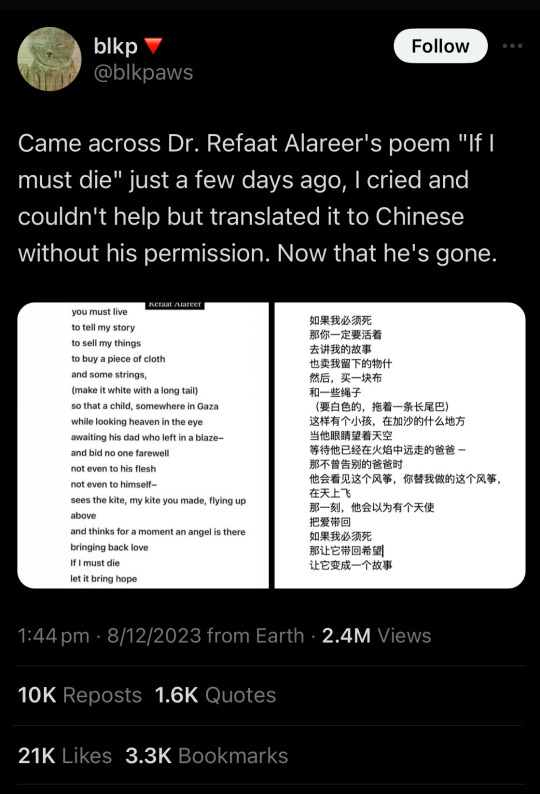
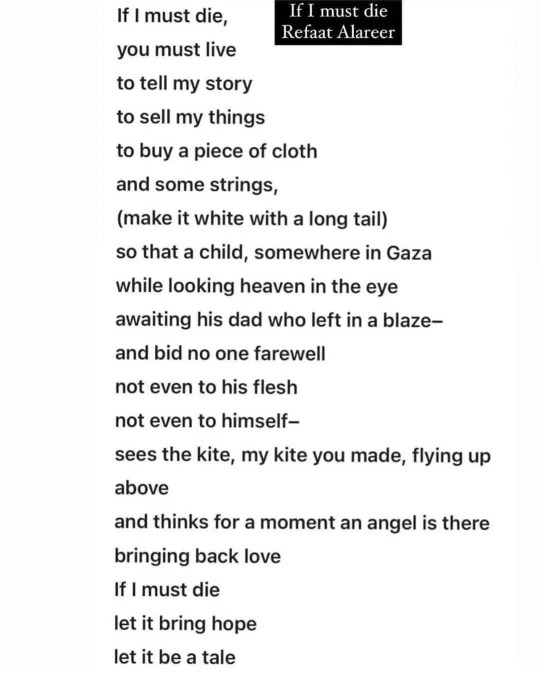

link
on twitter, a viral thread started where people around the world shared their translations of “If I must die”, the last work of Dr Refaat Alareer also known as "the voice of Gaza". A beloved poet, teacher and life-long activist for Palestine, he was recently assassinated along with members of his extended family by a targeted Israeli air strike. His loss leaves a hole in the heart of palestinians all over the world.
Below the cut, I’ll be posting the translations of his poem, with links to the original posts. Unfortunately, tumblr limits posts to a maximum of 30 images. I will update when I can.
Arabic (Refaat’s mother tongue)
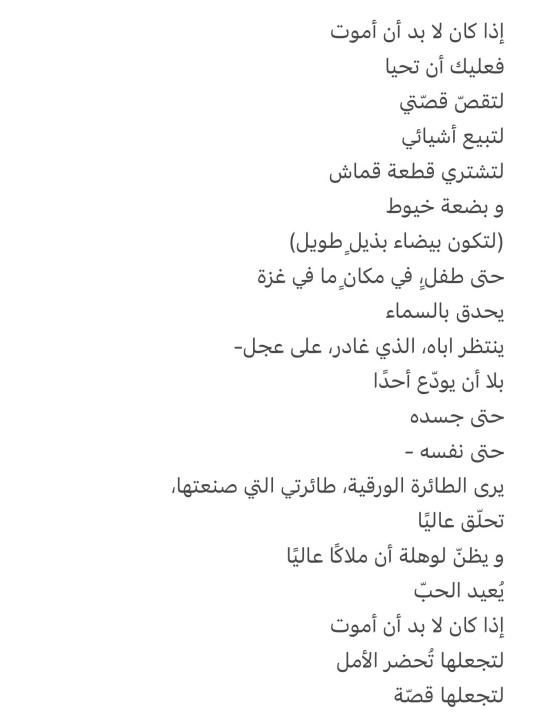
--
2. Spanish
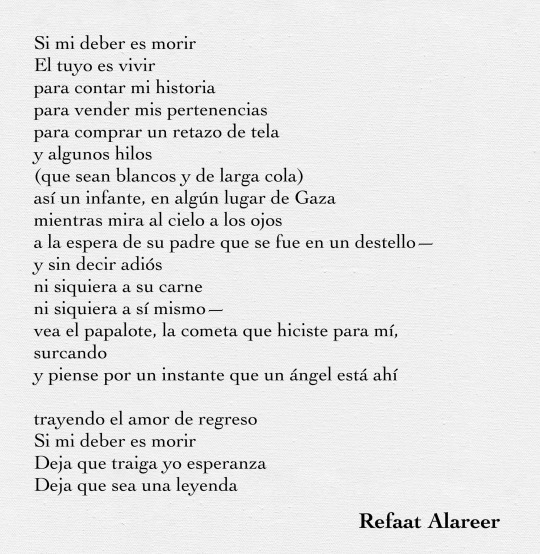
--
3. Irish

--
4. Dutch

--
5. Greek
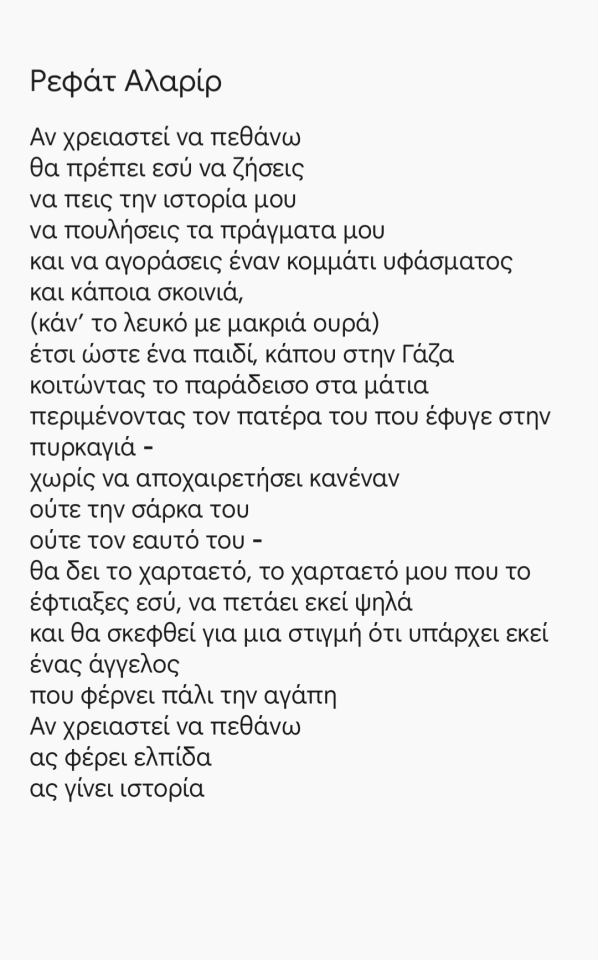
--
6. German
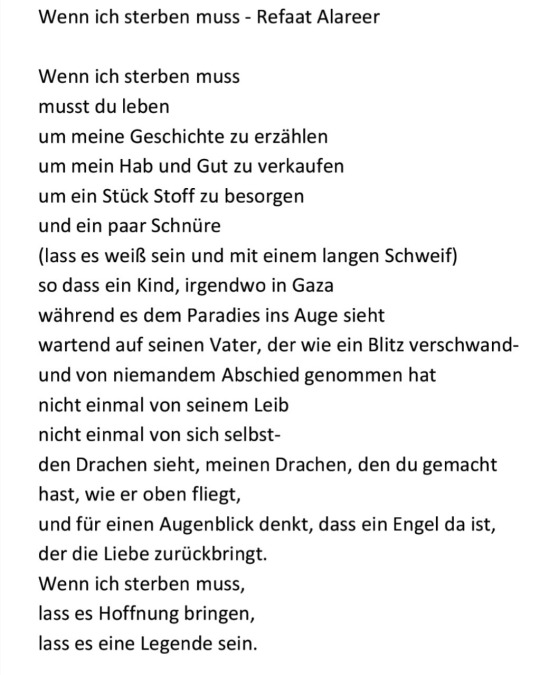
--
7. Vietnamese
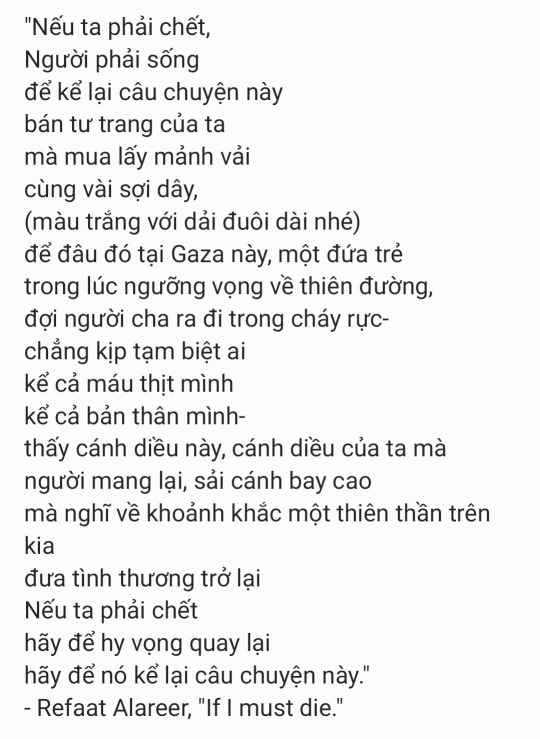
--
8. Tagalog
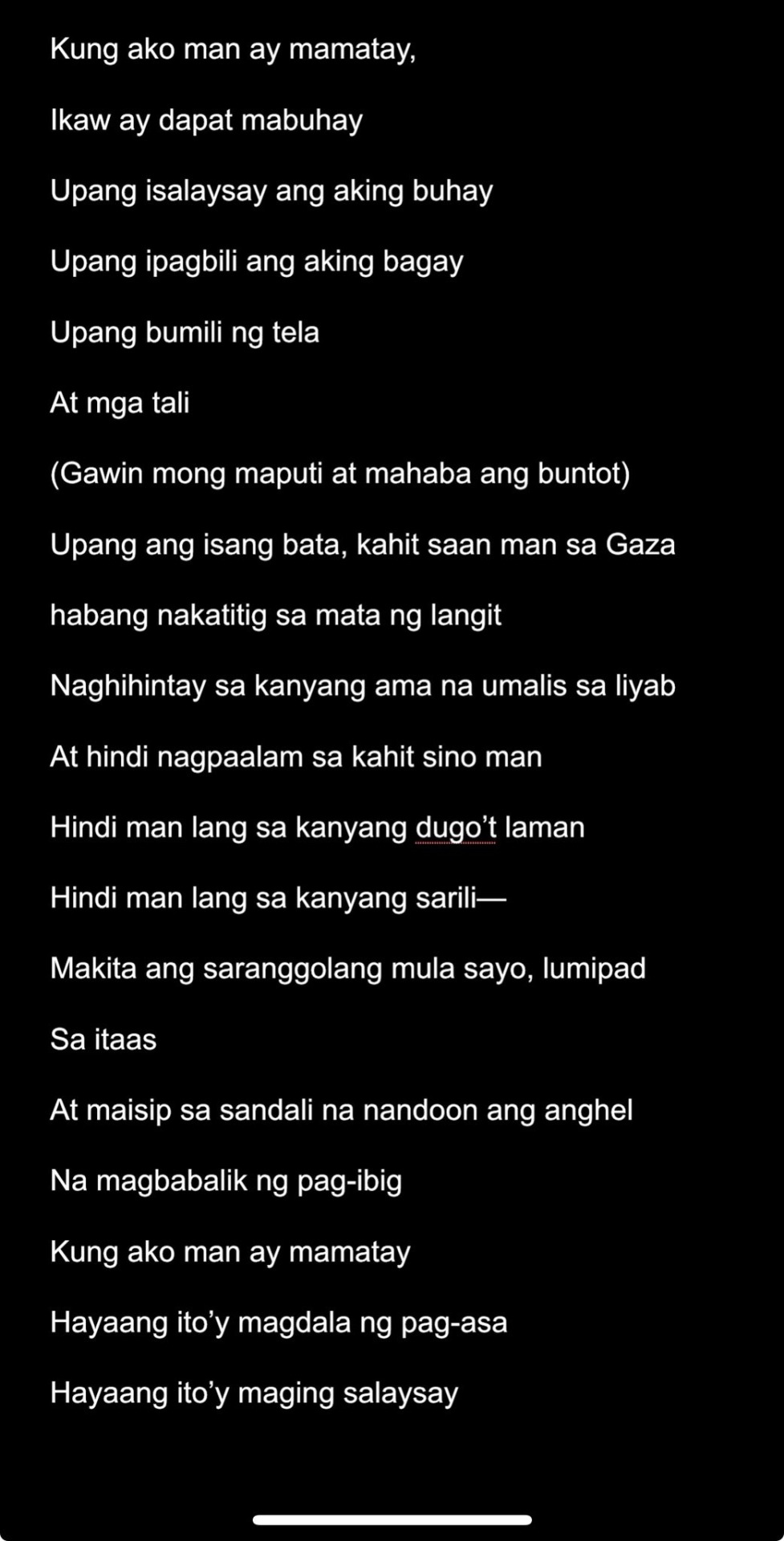
--
9. Serbian

--
10. Japanese
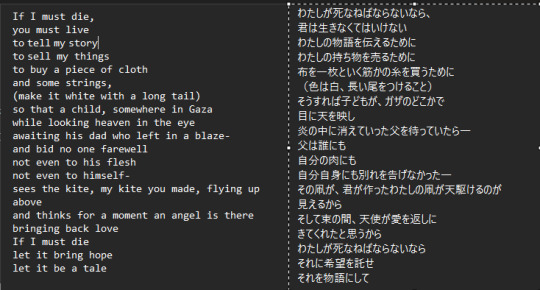
and the traditional japanese calligraphy version

--
11. Nepali

--
12. Tamil

--
13. Bosnian
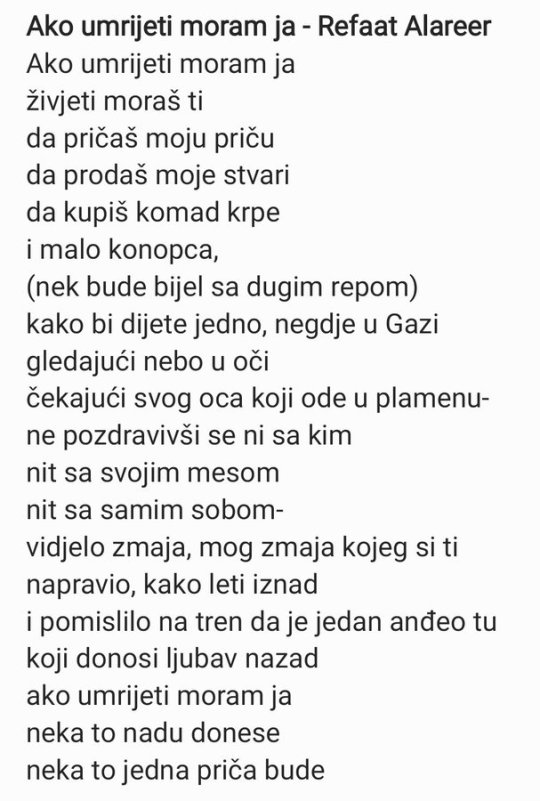
--
14. Indonesian
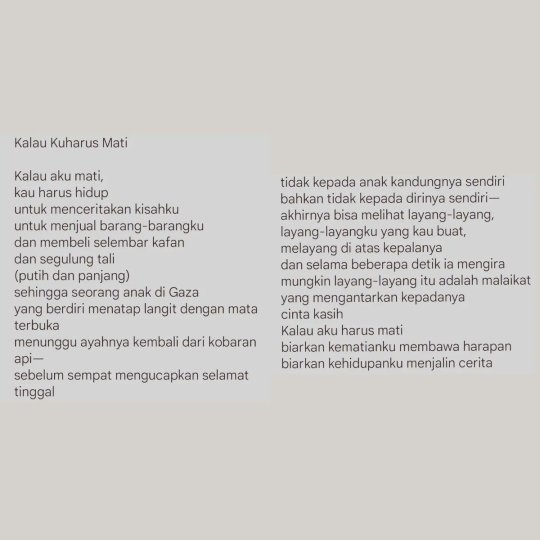
--
15. Romanian
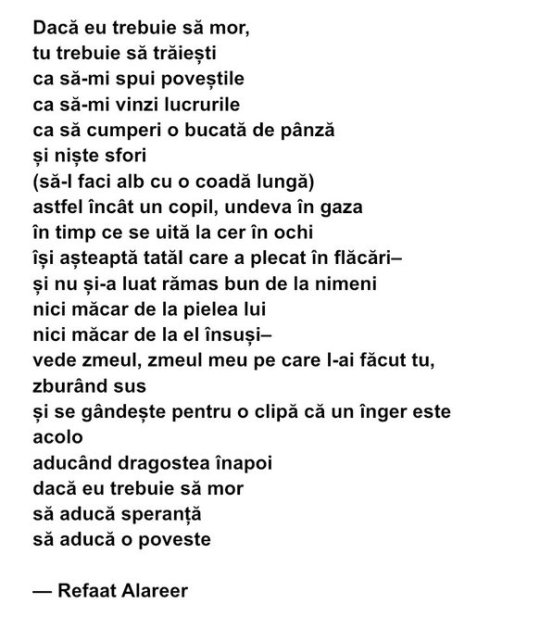
--
16. Italian
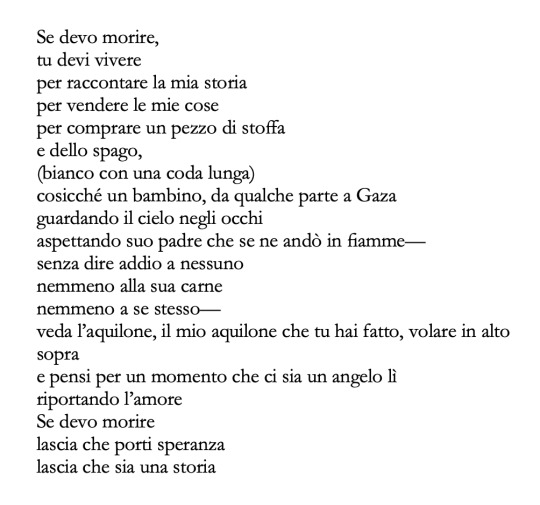
--
17. Albanian
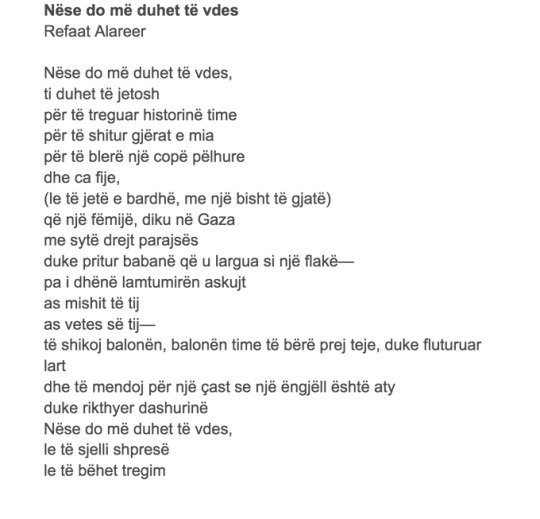
--
18. Urdu

--
19. Turkish

--
20. Polish

--
21. Norwegian
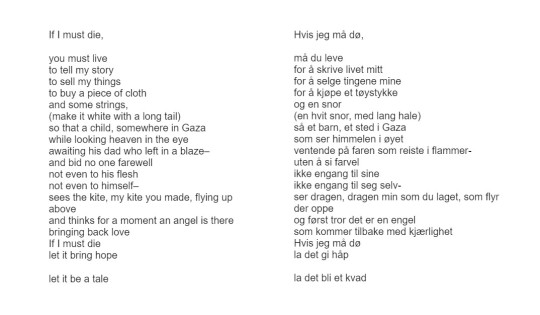
--
22. Galician
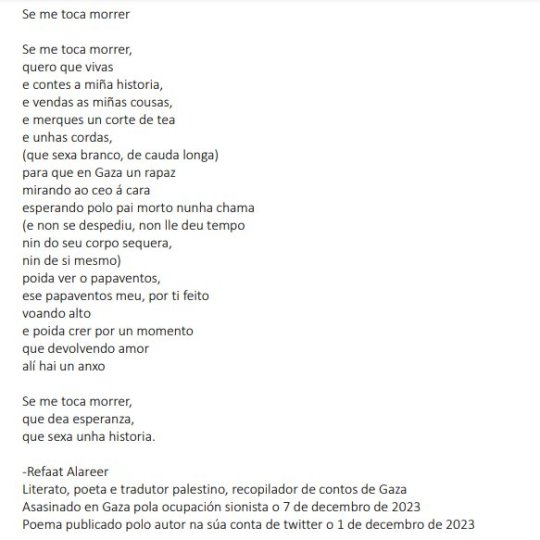
--
23. Swedish
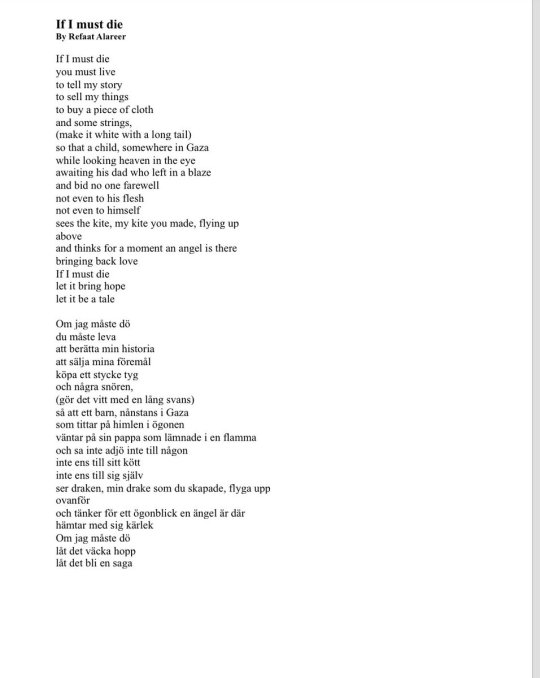
--
24. Jawi
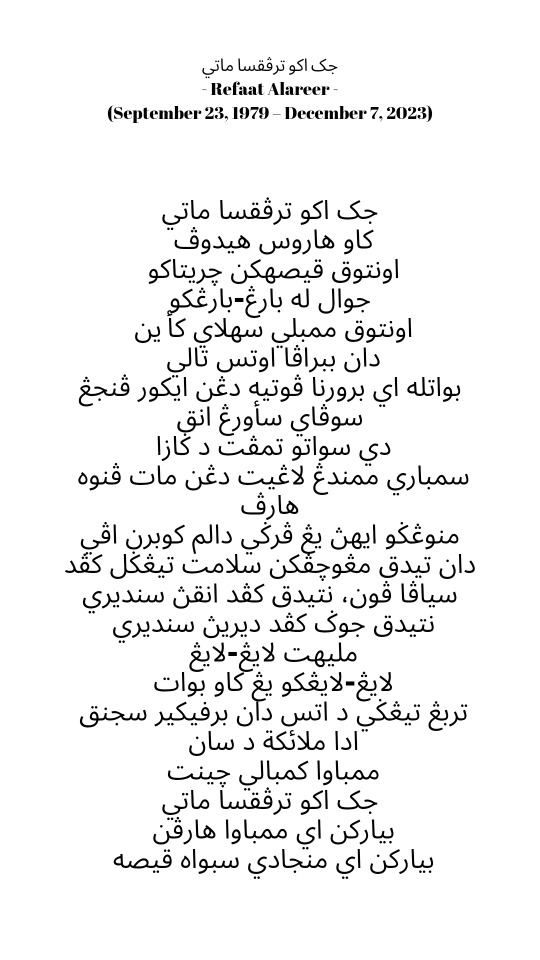
--
25. Bengali
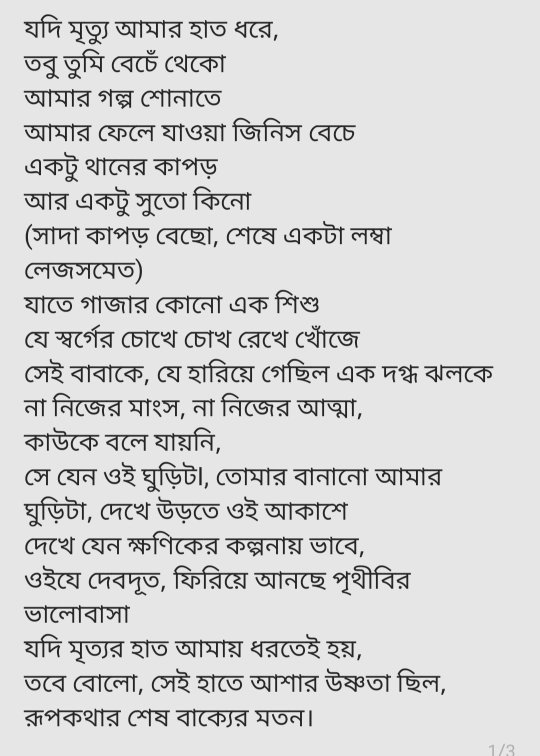
--
26. Russian
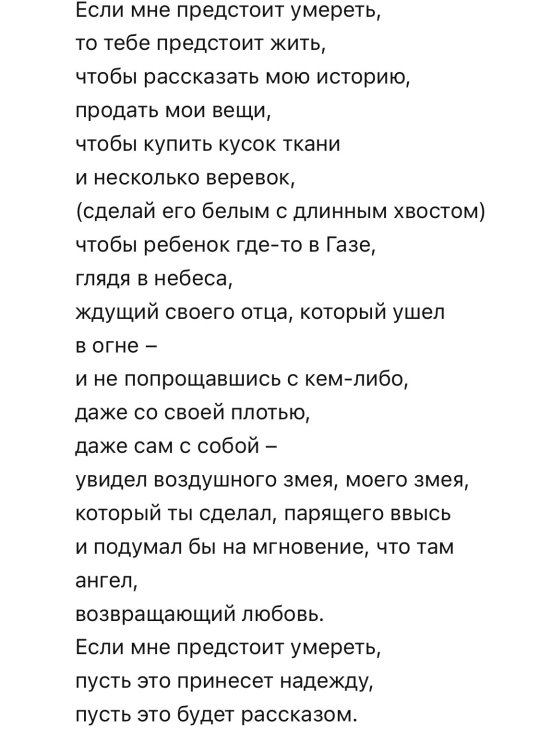
#probably one of the most beautiful threads to ever grace twitter's rotten husk of a platform#i really earnestly almost cried#when people say the world stands with palestine#they mean they speak with palestine as well#israel murders palestinian poets to silence their voice. their culture. their lifeblood#in response the world amplifies his voice tenfold#but what a loss#what an unforgivable loss#i hope it is some consolation to those who loved refaat that his words are now immortalised in languages all over the world#that he has united so many people in their pursuit of palestinian freedom#please please please feel free to add your own translations onto the post in reblogs#i just havent seen anything about this thread on tumblr yet#im just the messenger#palestine will be free#the words of refaat alareer will be immortalised#and his students will carry on his legacy#ah but it is almost 5am and i havent slept#when i wake up i will add more#free palestine#israel#refaat alareer#rest in peace
3K notes
·
View notes
Text
Idk man I might get torn to shreds for saying this, but I simply cannot understand the new trend, particularly among younger internet users, where people write a laundry list of their triggers in their bio and then expect everyone to read and cater to said list on a PUBLIC PLATFORM.
This is the same mentality that drives people to attack appropriately tagged fics on AO3 for having x y or z content because “How dare you post this when I have trauma about this???” Obviously if someone is going to write a super heavy and highly sensitive fic and NOT tag it properly, they ought to be called out on it. But this isn’t about that, it’s about the people who don’t curate their own content, it’s about the people who enter public spaces and demand that the general public cater to THEM specifically.
Additionally: Listing out your triggers for everyone to see is just ASKING for trolls to come into your inbox and flood you with triggering content. (Unfortunately, as much as we would like to believe otherwise, the internet is full of selfish jerks who don’t give a crap about anybody’s trauma.) Not only this, but the algorithm does not read your bio. The algorithm does not care about your triggers unless YOU make sure to block specific tags and content.
YOU are responsible for curating your own content, and nobody else.
Obviously this is not to say people shouldn’t try to tag their posts for common triggers, because that’s the common courtesy thing to do. But if Becky has a phobia of bees, it is on her to block that tag and curate her feed around it, and she does not get the exclusive right to suddenly demand that nobody talk about bees within a ten mile radius of her. If Alec has a phobia of dogs, then it is well within his right to avoid contact with them, but he doesn’t get to go to a public park and yell at anybody who brings their dog there. It is his responsibility to know his own limits and seek out parks that are dog-free. (If someone brings a dog to a dog-free area, that’s a whole different issue that I won’t be getting into rn but yes, the person who does that is in the wrong there.)
The internet is widely a public space. If you want to create a safe space completely and utterly free of your specific triggers, you have to put the work in to make that space for yourself. You don’t get to ask other internet strangers to do it for you.
I’m saying this out of genuine concern (and admittedly, frustration) because there are so many young teens in fandom nowadays who don’t understand this, and they end up putting themselves in extremely vulnerable and even downright dangerous situations because they don’t understand that putting your well-being in the hands of a stranger is a terrible idea.
Please be safe, and for the love of all that is holy, be reasonable. Curating your content yourself is just as much a protection for you as it is a vital key that allows public communities to function.
#hyramblings#fandom culture#internet discourse#trauma triggers#anxiety triggers#safe space#if I get one person saying “BUT WHAT IF SOMEONE IGNORES X AND DOES IT ANYWAY#we literally went over this#they’re a jerk and have responsibility too#but this ain’t about them rn#ya feel?#internet communities#fandom community
5K notes
·
View notes
Text
Author with cultural disconnect: How do I write without making it seem as if I hate my own heritage?
Anonymous asked:
I’m a white-passing Asian author, and I’ve never felt all that connected with my heritage.
My current story centers on a fairy (re: fantasy-world POC) child and ends with her realizing that her parents are toxic af and her human best friend’s family takes her in. This is the perfect opportunity to sort through my own issues with my heritage and finally convince my monkey-brain that it’s okay to not know how to cook Vietnamese food or celebrate tet or speak Vietnamese…
But I also realize that if I’m not careful, this could easily slip into “Hey, I hate my heritage and so should you!” So how can I stop that from happening?
Writing for yourself first, not an audience
I ask you a simple question: why put pressure on yourself to have any sort of non-offensive messaging for a story that hasn’t been drafted yet and is to convince your monkey brain it’s okay to exist as yourself?
That seems like the fastest way to stop the story from being actually cathartic and instead a performance art piece when you already feel hung up on performing as “properly” part of your culture.
As I said in Working Through Identity Issues and Other Pitfalls of Representation, not all stories you write need to be for public consumption. Especially stories you’re using for your own self-processing and therapy, because you’re trying to get a cathartic moment that is rewriting your own story.
At what point does the public need to be involved in that?
I do understand the compulsion to want to post—I have definitely posted some Questionable™ material in my drive to get validation for feeling the way I do, wanting people to witness me and say “same.” It’s a powerful urge. Sometimes it’s worked, but most of the time it’s just made me feel horrifically exposed.
But you really do not have to post in public to get any sort of validation. Set up a groupchat with friends if you want the cheerleading and witnessing—people who will know your story and give you good-faith interpretations and won’t accuse you of anything. Honestly I’d suggest setting up this groupchat anyway; as someone who just got one again after quite a few years without it, my productivity has skyrocketed from being around supportive people.
Let the monkey brain have its monkey brain moment and shut off the concept the story is for the public. Shut off the concept of performing for an unknown audience. It’s for you. Be authentic, no matter how bad it would look to outsiders. They’re not reading it. Part of getting catharsis, sometimes, is being the worst version of yourself, somewhere nobody else can see it.
Deciding to publish the work
If, after you do write it, you find that you actually do want to polish it up and put it somewhere… edit it. Rewrite it entirely if that’s what it takes. Take the story through the same drafting process every story needs to go through, ripping out the unfortunate implications as you go.
Editing can be its own form of healing, as you try to figure out what this character would need to not be hateful. As you realize, once this longform journal entry is out of your head, what was bothering you now that you can see it pinned down on a page. But you absolutely do not need to write with the intention of editing in that healing. When I’ve tried, it’s fallen flat.
The healing will come from being yourself, no public involved, and writing about your feelings in their rawest form. Anything else is extra.
There’s no point in trying to put guard rails on the drafting process, not for a deeply personal piece. And by the time that drafting process is done, you’ll likely have specific scenarios and contexts that you can ask about, and you might even have ideas on how to fix it yourself once the story has a shape to it.
This is 100% a situation where there’s no real sense in idea workshopping something in the plotting stage. You’re doing something for you. Decide if it’s for public consumption later (while acknowledging “no” is a perfectly valid answer), and only figure out how to make the story not overtly harmful if you decide to put it out into the public.
~ Leigh
962 notes
·
View notes
Text
Whenever people who are entrenched in diet culture talk about how terrible chemicals are, I just want to whip out this:
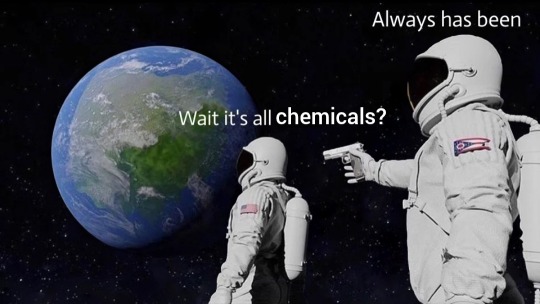
#diet culture#diet culture tw#described images#image description in alt#'it's got CHEMICALS in it' and so do you! and me too! IT'S ALL CHEMICALS ALL THE WAY DOWN#instead of running from this world we must learn to embrace it#i'm not particularly angry at people who say this because it makes me think that they're incredibly invested in diet culture...#...i just don't want the whole 'food = bad' or 'bodies = bad' to go unchallenged...#...part of the reason why diet culture seems just as prevalent now (if not moreso) is partially because it isn't really...#...challenged or questioned without provocation. it's just assumed to be correct because it makes you 'feel in control'#when chemicals are bad you can control what chemicals you consume. it's individualistic and places the blame onto you for 'being good'#it places responsibility onto the person in such a way that it becomes impossible to fulfill#it isn't that i'm upset that people want to treat their bodies in a way they think is responsible...#...moreso that the *way* they go about it ensures that they're stuck in a cycle of self-blame and even self-hatred#because the METHOD is ineffective. not the desire to treat your body well#also the state of ohio looks stupid and i do Not respect it#it looks like a ball that is simultaneously deflated and over-inflated#also their state flag looks silly to me#it looks like the person who was making it fell asleep making it#i'm just clowning on ohio at this point. have never been to ohio but. are you guys okay
993 notes
·
View notes
Text

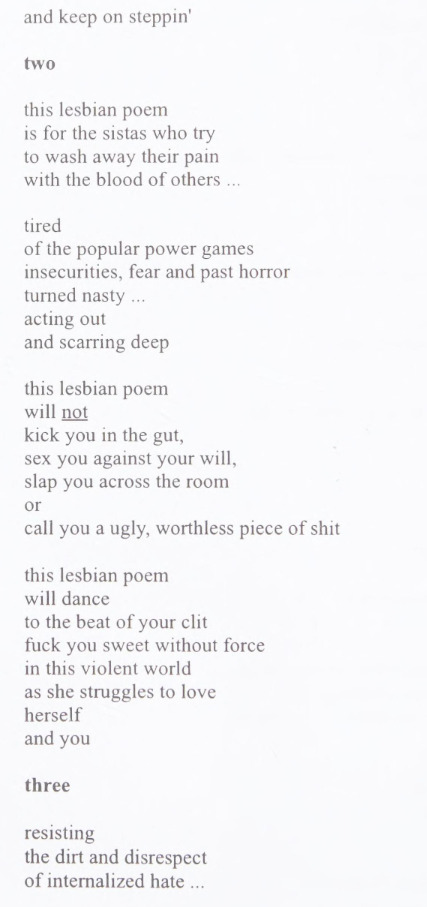
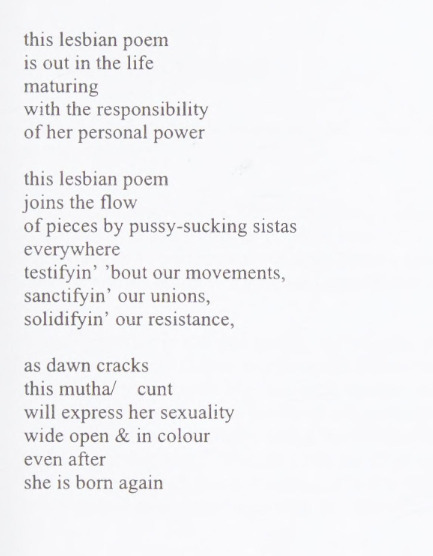
This Lesbian Poem by Akhaji Zakiya
from Lisa C Moore's Does Your Mama Know?: An Anthology of Black Lesbian Coming Out Stories
#lesbian culture#lesbian poetry#black lesbians#coming out#resisting the dirt and disrespect#maturing with the responsibility of her personal power#testifyin bout our movements#sanctifyin our unions#solidifyin our resistance
609 notes
·
View notes
Text
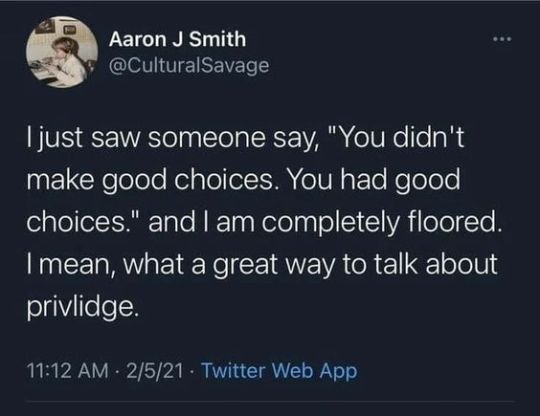
#pro choice#responsibility#purpose#failure#choices#focus#culture#class war#class warfare#anti capitalism#eat the rich#fuck landlords#class struggle#anti capitalist love notes#anti capitalists be like#fuck capitalism#late stage capitalism#capitalism#socialism
2K notes
·
View notes
Text
Upon reflection. House of Usher feels like to me the catharsis of years of pent up anger at the blorbofication of succession characters. Mike said no you know what they’re all awful people and they should choke. And frankly? I’m with him on that. My genuine biggest complaint about the end of succession was that not enough of those cunts actually died and I’m quite happy with the entirety of the usher family (symbolic of the inherent rot of the american capitalist experiment) eating complete shit over the course of the narrative.
#something something cultural response… yeah you know I can dig that#big brained thoughts happening#THIS was the real succession series finale. to me. thank you mike#god damn but if mike don’t make me think#fall of the house of usher#spoilers#… I guess? they were dead from the start tho I mean
617 notes
·
View notes
Text

Towers are a neolithic sophont race with two strains.
#my art#towers#Hrng I have so much info on towers you don’t know#speculative biology#Chances are if you send an ask about their physiology/psychology/culture/technology I will have a response.#Nearly every ask I’ve received I have a response to.
631 notes
·
View notes
Note
Odd question, but since they're both dogs and I imagine smell is important to them, what do Machete and Vasco smell like?
Smells are indeed important to them. I think their sense of smell is definitely more keen than ours but not nearly as extreme as that of real dogs. It would be kind of world/society/behavior breaking if one of their senses was that much above what we as humans can even imagine.
Fur absorbs smells more efficiently than skin, so the environment each person spends most of their time in affects the way they smell (the same way your clothes tend to hold scents from the places you've recently been to).
Machete tends to smell mainly of frankincense, the primary ingredient of the sacred incense burned during worship. Smells are hard to describe but to me frankincense smells sweet, smoky, earthy, citrusy, piney, resinous and woody. Evokes the feeling of sanctity. There's also traces of ink, paper and old books. If he had been treated recently and you got really close and knew to look for it, you might be able to detect the cuts where he was bled.
Vasco uses perfumes skillfully, his favorites contain iris root and damask rose. The mellow scent of his high quality soaps often lingers for quite a while as well. If he's been outdoors, there's a more noticeable hint of leather, as well as moisture, earth, greenery, animals and various other nature smells. Since he's characterized by his vitality, I can't escape the feeling that if you were to put your nose on him, he'd smell like a warm, healthy, living thing even more strongly than people usually do, even if you didn't consciously realize it.
#just like real canines my dog folk only have sweat glands on their paw pads#these two also take good care of their hygiene so their fur doesn't accumulate the culture of bacteria and yeast that is responsible#for the wet dog smell#answered#anonymous#Vasco#Machete#Vaschete lore#not an odd question at all#I'm a very olfactory person myself I like smelling nice things#incenses (resins in particular) have been a hobby of mine for many years and recently I've gotten more into perfumes as well
444 notes
·
View notes
Text
The liberal culture of perpetually walking on eggshells, fearing that whatever you say might offend somebody, or (alternatively) feeling like you are always a victim to everybody's microaggressions is extremely unhealthy.
The conservative culture of perpetually being rude under the guise of "just saying it like it is", completely disregarding that what you say might offend somebody, or entering into conversations always on the defense is extremely unhealthy.
People in both left and right political groups who fit within these behavioral patterns seem to operate off of getting high from feeling righteousness.
These behavioral trends in both groups breed authoritarianism, paranoia, ignorance, aggression, ideological purity, and black and white thinking.
#as someone who frequently interfaces with both political cultures#you all have more in common than you realize#but judge each other based on the extremists within the other group#and this just in turn makes one's own group become more extreme in response#and also is just terribly obnoxious#politics#human rights#conservatism#conservative#liberal#democrat#republican#libertarian#anarchist#progressive#activism#LGBT#LGBTQ#feminsim#marxist#right wing extremism#left wing extremism
898 notes
·
View notes
Text
my autistic boyfriend hates asmr but as the autistic girlfriendthing i love it!!!!!!!!!!!!
#🦈: my posts#🦈: silly#🦈: poll#(interested to see if i will get any responses)#autism#autistic#actually autistic#audhd#asmr#asmr video#lofi asmr#asd#autism spectrum disorder#autism spectrum#autistic spectrum#autistic culture#neurodivergent#neurodiversity#neurodivergency#audhd creature#<- this tag just felt right lol#poll#tumblr polls#polls#autism poll#autonomous sensory meridian response
474 notes
·
View notes